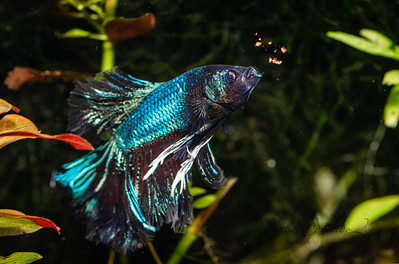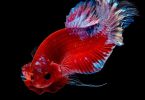Table of Contents
If you’re a betta fish owner, you may be wondering whether it’s possible to overfeed your betta fish. The short answer is yes, you can overfeed a betta fish. In fact, overfeeding is one of the most common mistakes that betta owners make, and it can lead to a variety of health problems for your fish.
Betta fish are known for their voracious appetites, and it can be tempting to feed them every time you walk by their tank. However, feeding your betta too much can cause a number of issues. Overfeeding can lead to bloating, constipation, and swim bladder problems, all of which can be harmful to your fish’s health. Additionally, uneaten food can quickly pollute the water in your betta’s tank, leading to further health problems.
Understanding Betta Fish Diet
Betta fish are carnivorous and require a diet rich in protein. Their diet primarily consists of pellets, bloodworms, worms, insects, brine shrimp, and other live foods.
Betta pellets are the most common food for betta fish and are readily available in most pet stores. These pellets are specially formulated to meet the nutritional needs of betta fish and are usually made from fish meal, shrimp meal, wheat flour, and vitamins.
Bloodworms are another popular food for betta fish and are high in protein. However, they should be fed sparingly, as they can cause digestive issues if overfed.
Worms, such as blackworms, are also a good source of protein for betta fish. They can be fed live or frozen and can be purchased at most pet stores.
Insects, such as crickets and grasshoppers, are a great source of protein for betta fish. However, they should only be fed to betta fish that are large enough to handle them.
Brine shrimp are another popular food for betta fish and are high in protein. They can be fed live or frozen and are readily available in most pet stores.
It is important to provide betta fish with a varied diet that includes both live and frozen foods, as well as pellets. This will ensure that they receive all the necessary vitamins and proteins they need to stay healthy.
When feeding your betta fish, it is important to avoid overfeeding. Betta fish have small stomachs and can easily become overweight if they are overfed. A good rule of thumb is to feed your betta fish only as much as they can eat in two minutes, twice a day.
The Risks of Overfeeding Your Betta Fish
Overfeeding your betta fish can lead to a variety of health issues. Betta fish have small stomachs and can easily become overfed, leading to constipation, bloating, and obesity. Overfeeding can also cause lethargy and swim bladder disease, which can make it difficult for your betta fish to swim properly.
One of the main risks of overfeeding your betta fish is weight gain. Betta fish that are overweight may develop fatty liver disease, which can lead to serious health issues. A bloated belly is a common sign of overfeeding, and if left untreated, can cause long-term health problems.
In addition to the physical health risks, overfeeding can also lead to behavioral issues. Betta fish that are overfed may become lethargic and less active, which can impact their overall quality of life.
To avoid overfeeding your betta fish, it’s important to monitor their feeding habits and adjust their diet accordingly. A good rule of thumb is to feed your betta fish small amounts of food two to three times a day, rather than one large meal. You should also avoid feeding your betta fish any food that is high in fat or protein, as this can contribute to weight gain and other health issues.
Signs Your Betta Fish is Overfed and What to Do
Overfeeding your betta fish can lead to a variety of health issues. It’s important to know the signs of overfeeding so you can take action before it’s too late.
One of the most obvious signs of an overfed betta is lethargy. If your fish is spending more time resting at the bottom of the tank or hiding, it may be a sign that it’s feeling unwell. Another common issue is swim bladder disorder, which can cause your betta to have trouble swimming properly.
A bloated belly is another sign of overfeeding. If your betta’s belly looks swollen or distended, it’s likely that it’s been eating too much. Cloudy water can also be a sign of overfeeding, as uneaten food can cause ammonia spikes in the tank.
To avoid overfeeding your betta, it’s important to pay attention to the signs. Feed your fish only what it can eat in 2-3 minutes, twice a day. You may also want to consider fasting your betta once a week to help prevent bloating and other health issues.
If you notice any signs of overfeeding in your betta, take action immediately. Remove any uneaten food from the tank, and consider doing a partial water change to help reduce the ammonia levels. If your betta is showing signs of swim bladder disorder or other health issues, consult with a veterinarian who specializes in fish health.
How to Properly Feed Your Betta Fish
Feeding your betta fish is an important part of keeping them healthy and happy. However, it’s important to do it properly to avoid overfeeding, which can lead to health problems. Here are some tips on how to properly feed your betta fish:
- Portion Control: Bettas have small stomachs and can only eat a small amount of food at a time. Overfeeding can lead to constipation, bloating, and swim bladder issues. It’s recommended to feed your betta fish 2-3 pellets or flakes twice a day.
- How Often to Feed Betta Fish: It’s important to establish a feeding schedule for your betta fish. Feeding them at the same time every day will help them establish a routine and prevent overfeeding. It’s recommended to feed your betta fish once in the morning and once in the evening.
- Moderation: Although bettas love to eat, it’s important to feed them in moderation. Overfeeding can lead to obesity and other health problems. Remember, less is more when it comes to feeding your betta fish.
- Special Treat: Bettas love variety in their diet. You can offer them a special treat like freeze-dried bloodworms or brine shrimp once a week. However, it’s important not to overdo it as too many treats can lead to overfeeding.
- Experiment: Every betta fish is different and may have different feeding preferences. Experiment with different types of food to see what your betta fish likes best. Just remember to always feed in moderation.
By following these tips, you can ensure that your betta fish is properly fed and happy. Remember, portion control, feeding schedule, and moderation are key to keeping your betta fish healthy.
Maintaining a Healthy Environment for Your Betta Fish
To keep your Betta fish healthy and happy, it is important to maintain a clean and healthy environment for them. This means providing them with a suitable tank or aquarium, ensuring good water quality, and maintaining an appropriate water temperature.
Tank
Betta fish need a tank that is at least 5 gallons in size. A smaller bowl or container is not suitable for them as it can restrict their movement and lead to stress. A larger tank also provides more stable water conditions, which is essential for the health of your fish.
Water Quality
Maintaining good water quality is crucial for the health of your Betta fish. Poor water quality can lead to a range of health issues, including fin rot, bacterial infections, and even death. To ensure good water quality, you should perform regular water changes and use a water conditioner to remove harmful chemicals and toxins from the water.
Environment
Creating a suitable environment for your Betta fish is also important. This means providing them with plenty of hiding places, such as plants and decorations, and ensuring that the tank is not placed in direct sunlight or near a draft.
Water Temperature
Betta fish are tropical fish and require a water temperature of around 78-80°F. An inappropriate temperature can lead to stress and illness. You should use a heater to maintain a consistent water temperature and avoid sudden changes in temperature.
Choosing the Right Food for Your Betta Fish
When it comes to feeding your Betta fish, choosing the right food is essential to ensure its health and well-being. There are many different brands of Betta food available on the market, but not all of them are created equal.
It’s important to choose a high-quality food that is specifically designed for Betta fish. This will ensure that your fish receives all the necessary nutrients and minerals it needs to stay healthy and vibrant.
One way to ensure that you are choosing a quality food is to consult with a veterinarian who specializes in aquatic animals. They can recommend the best brands and types of food for your Betta fish based on its specific needs and dietary requirements.
When shopping for Betta food, it’s also important to read the labels carefully. Look for foods that contain high levels of protein, as this is essential for the growth and development of your fish.
You can find Betta food at most pet stores, but be sure to choose a reputable store that sells quality products. Avoid buying food from discount stores or online retailers that may not provide the same level of quality and assurance.
In addition to choosing the right food, it’s important to feed your Betta fish the appropriate amount. Overfeeding can lead to health problems and even death in severe cases. Consult with a veterinarian or do some research to determine how much food your Betta fish needs on a daily basis.
By choosing a high-quality food and feeding your Betta fish the appropriate amount, you can ensure that it stays healthy and vibrant with beautiful colors for years to come.







